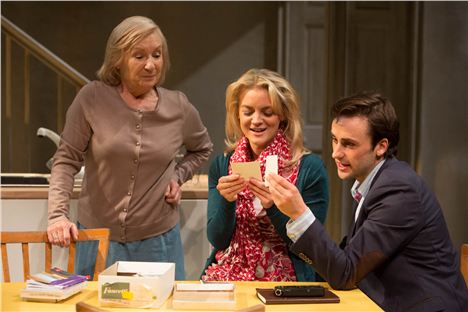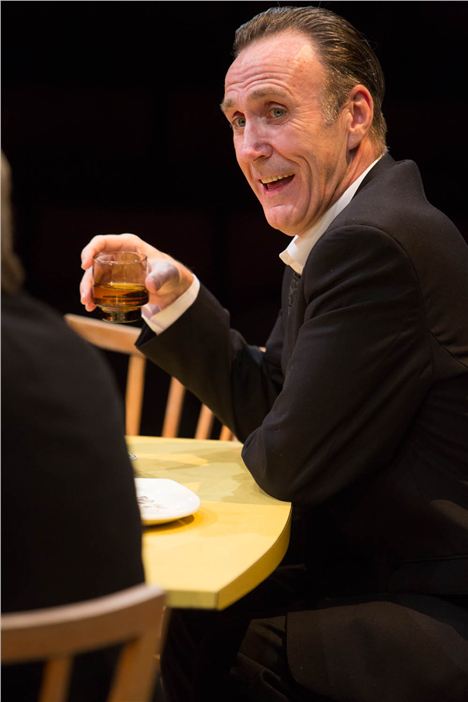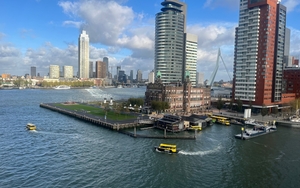NOW that the new Everyman has been officially christened with its opening production of Twelfth Night, its follow-up is much nearer home.
Hope Place was commissioned for the opening season, with Birkenhead-born Michael Wynne’s semi-autobiographical work bringing a wide range of familial experiences and reminiscences to a largely appreciative audience. Well, there was a lot of head-nodding and whispers of recognition going on.
Anyone who knows their scouse from their Lancashire hot-pot will get this play. There’s big chunks of real meat in the acting with the kick of red cabbage swearing to spice the dialogue along
The main context of Hope Place is the divisive repercussions on the four siblings following the funeral of matriarch Lottie – the prominent one being the potential future of the large late-Victorian house now that the only occupant left living there is Maggie [Eileen O’Brien]. The other three – Jack [Joe McGann], Veronica [Tricia Kelly] and Eric [Neil Caple] jointly decide that a quick buck is in the offing but there’s one problem. The house doesn’t actually belong to them. It doesn’t even belong to Maggie, it’s owned by a social landlord. That’s when the tensions begin to creep in and the hairline cracks soon seep venom, jealousy and deep-rooted anger. The past may, indeed, be another place but this one isn’t filled with hope.
Cue the arrival of Josie, Veronica’s daughter [Emma Lisi] with her undergraduate boyfriend Simon [Ciaran Kellgreen]. He’s studying history, in particular, oral history, so this is fertile ground and is soon arranging mini-interviews. However, what starts as an academic exercise soon begins to unearth family secrets which have massive consequences. If the Victorians used to believe that a little education was dangerous thing, Simon’s opening of the Pandora’s box leads from initial animosity to a full-blown domestic crisis.
 Eileen O'Brien as Maggie, Emma Lisi as Josie and Ciaran Kellgren as Simon: Pix, Jonathan Keenan
Eileen O'Brien as Maggie, Emma Lisi as Josie and Ciaran Kellgren as Simon: Pix, Jonathan Keenan
Hope Place could quite easily have been called Maggie’s Story. Much of the plot development centred on her metamorphosis from downtrodden spinster to avenging angel. Some scenes are interspersed with flashbacks to her own upbringing in the house with some fine cameos from her docker father [Alan Stocks] and almost destitute mother [Michelle Butterly]. These flashbacks worked surprisingly well, particularly in the second half, corresponding to Maggie’s perceived state of senile dementia.
Other elements brought some surreal touches – Jack dressed as a Sgt. Pepper Beatle having just finished one of his “entertain the tourists” slots, Veronica’s recitation of “On a mountain stands a lady” with skipping, the presentation of a real cat which everyone else thought imaginary, living snapshots from different periods of Hope Place’s origins – 1699 and the fishing village, 1892 and the rowdy music-hall revue with Lily Lloyd singing “There was I, waiting at the church” – homage no doubt to the Everyman of old.
On reflection, the Everyman’s decision to commission Wynne (who penned the TV comedy Being Eileen) was a wise move. He’s already an Olivier award-winning playwright with some notable local achievements.
I suspect his own conversations with his mother, Johanna, gave him a good deal of first-hand accounts from which to build on. His collaboration with director Rachel Kavanaugh was a winning formula as they were able to craft a contemporary tale with an established stable of actors.
Home-grown productions need to work on a number of essential levels – authenticity, accents, shared experiences, sense of place, nuances, body language down to hard-faced realism. These came through quite strongly and the inherent dangers of cloying sentimentality and over-the-top scouse mannerisms were finely tuned. Occasional references to the bedroom tax, gentrification, immigration influx and the demise of the extended family were sensitively tackled and it was refreshing that the temptation to dwell on stereotypes was subtlety avoided.
One might imagine that similar tales could take place in any Northern city, port or otherwise. You might be right but it’s plainly about the heartland of Liverpool’s bohemian grandeur and, in many ways, the social transformation which it encountered over the past fifty years or so. In this case, terminology matters, especially when it concerns the contrasts between what makes a house and what makes a home.
Anyone who knows their scouse from their Lancashire hot-pot will get this play. There’s big chunks of real meat in the acting with the kick of red cabbage swearing to spice the dialogue along. As Maggie herself grew in stature and self-confidence, so did the emergence of the self-revelatory confessions which provided electrifying personal chemistry and stage dynamics.
Maggie’s closing lines, quite simple and so evocative, captured the essence of Hope Place: “I feel like I’m ready to tell my story”. The standing ovation was, for many who’d just witnessed a very special piece of Everyman history, just as heartfelt and appropriate.
*Until May 31
8/10















